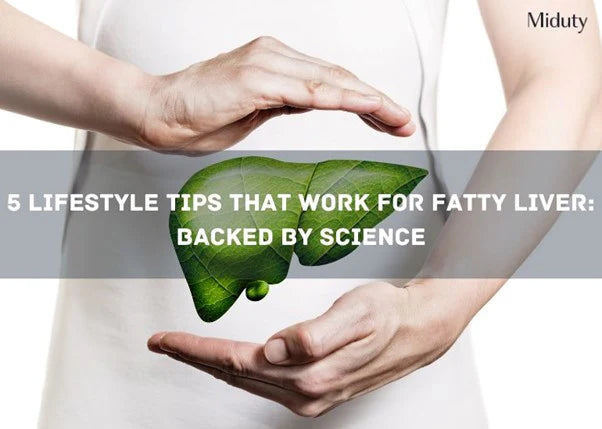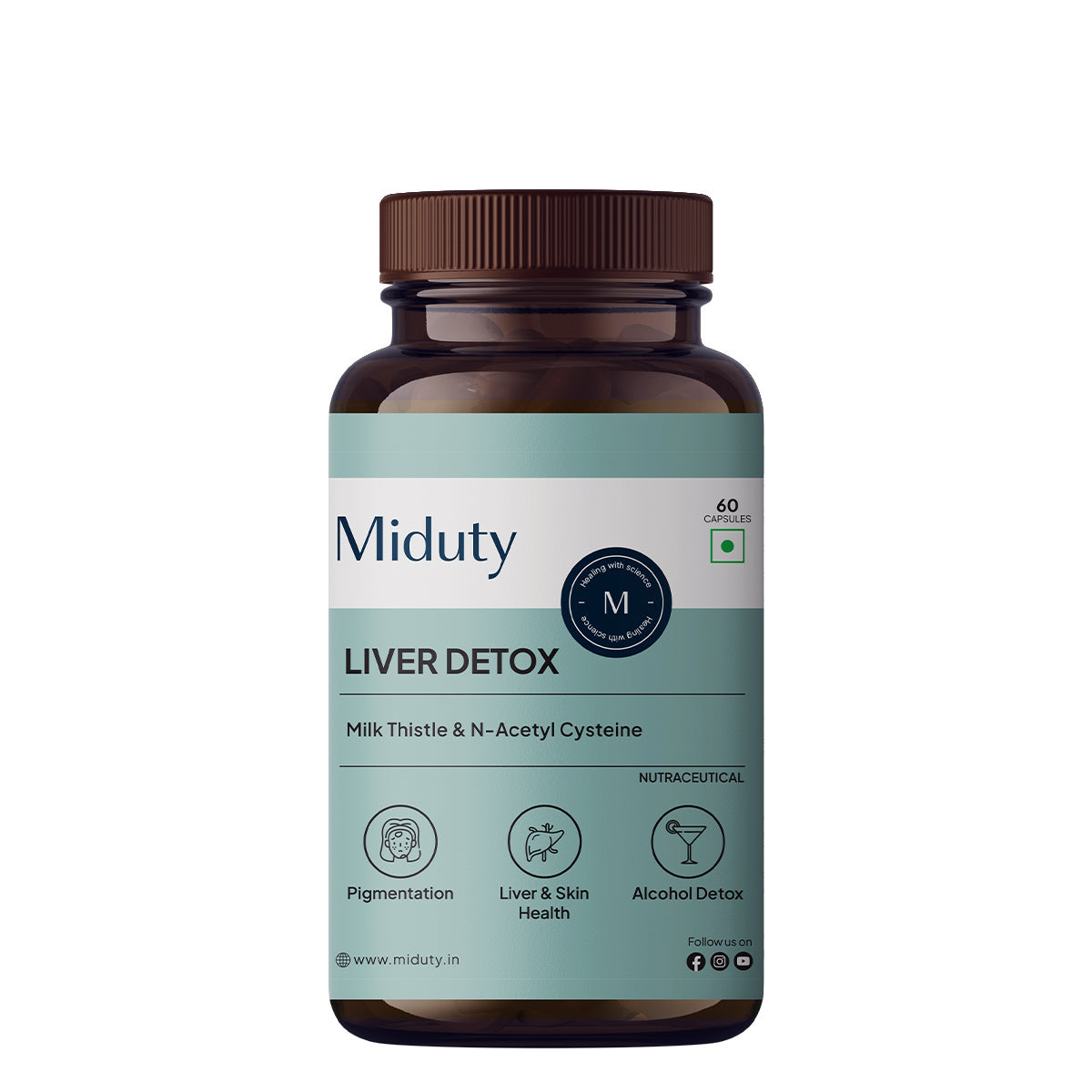
5 LifeStyle Tips That Work for Fatty Liver: Backed By Science
 Share
Share
- The liver is the only organ in the human body capable of significant regeneration. Even if 70% of the liver is removed, it can regenerate back to its full size within a matter of weeks.
- Fatty liver disease is often asymptomatic in its early stages, which means many people may have it without experiencing any noticeable symptoms.
- Studies have suggested that milk thistle supplementation may improve liver function tests and reduce liver inflammation in individuals with fatty liver disease.
In today's bustling world, our livers are burdened with double the workload, vital for filtering toxins and keeping us healthy.
However, modern lifestyles often lead to fatty liver disease, marked by liver fat accumulation, causing issues like skin pigmentation and more. It's crucial to understand that our liver's health directly impacts our overall well-being.
This blog delves into simple yet impactful lifestyle changes to reverse fatty liver disease. From adopting a balanced diet to staying active and managing stress, we'll explore practical tips to support liver health.
Importance of LifeStyle Changes in Reversing Fatty Liver Disease
Lifestyle changes are key to reversing fatty liver because they address the root causes of the condition. By adopting a healthier diet, getting regular exercise, managing stress, and avoiding harmful substances like alcohol, you can reduce liver fat accumulation and improve liver function.
These changes not only promote weight loss and overall well-being but also directly impact liver health, paving the way for reversal of fatty liver disease.
Tip 1: Include Liver Friendly Foods
Imagine your plate is like a battleground for your body's superhero, the liver. What you put on it can either help your liver fight off the bad guys or make its job harder.
Liver-friendly foods play a crucial role in managing symptoms of fatty liver disease by supporting liver health and function.

Research indicates that certain foods aid in reducing inflammation and promoting liver regeneration.
Vegetables like spinach, kale, and broccoli provide essential nutrients like folate and fiber, supporting liver detoxification processes.
Additionally, foods rich in healthy fats, such as avocado, nuts, and fatty fish like salmon, provide omega-3 fatty acids that may help reduce liver fat accumulation and inflammation.
Consuming these nutrient-dense foods can contribute to alleviating symptoms and improving overall liver health in people with fatty liver disease.
Tip 2: Lose Extra Weight
Losing excess weight can be a game-changer for fatty liver disease. When we shed those extra pounds, it helps reduce the fat that's accumulated in the liver, giving it a chance to heal and function better.
The American Association for the Study of Liver Diseases suggests people suffering from obesity and fatty liver should reduce 3-5% of their body weight to reduce fat accumulation in the liver.
However, it's important to lose weight in a healthy way. Many people may initially see a drop on the scale, but it's often just water weight or muscle mass, not the fat we want to lose.
Losing water weight doesn't address the root cause of fatty liver disease and can be easily regained, while losing muscle mass can weaken our body's overall health and metabolism.
Tip 3: Focus on Reducing High Cholesterol Levels
Lowering cholesterol is like giving your liver a boost to function properly and efficiently.
Research suggests that fatty liver can increase the cholesterol levels in the body and increase the risk of getting heart diseases.

It's important to limit unhealthy fats such as saturated and trans fats found in fried foods, processed snacks, fatty meats, and baked goods.
Instead, focus on incorporating healthy fats like those found in avocados, nuts, seeds, and fatty fish such as salmon and trout.
Tip 4: Use Olive Oil
Olive oil is like a secret weapon against fatty liver disease! It's packed with healthy fats that can actually help reduce liver fat and inflammation.
A randomized trial found that 20 grams of extra virgin olive oil daily resulted in a reduced grade of fatty liver in overweight/obese patients with non-alcoholic fatty liver disease (NAFLD), in contrast to those who consumed an equivalent amount of sunflower oil.
But here's the catch: olive oil shouldn't be used for cooking because it has a low smoking point, which means it can break down and release harmful compounds when heated too high.
Instead, drizzle it over salads or use it as a dip for bread. This way, you get all the liver-loving benefits without the risk of causing harm.
So, let's keep our livers happy and healthy by adding a splash of olive oil to our salads and dishes, and leaving the cooking to oils with higher smoking points!
Tip 5: Take Liver Friendly Supplements
Liver-friendly supplements like Milk Thistle and N-acetyl cysteine play crucial roles in combating and potentially reversing fatty liver disease.
Studies suggest Milk thistle contains a compound called silymarin, known for its antioxidant and anti-inflammatory properties, which aid in protecting liver cells from damage and promoting their regeneration.
Additionally, silymarin helps to stop the deposition of fat in the liver, thus reducing the progression of fatty liver disease.
N-acetyl cysteine, on the other hand, acts as a precursor to glutathione, the body's most potent antioxidant, which supports liver detoxification processes.
When used in combination, milk thistle and N-acetyl cysteine provide a synergistic effect, offering comprehensive support for liver health and aiding in the reversal of fatty liver disease.
Incorporating these supplements into a balanced lifestyle, alongside dietary changes and regular exercise, can significantly contribute to the restoration of liver health and the prevention of further liver damage.
The Bottom Line
In conclusion, lifestyle adjustments are pivotal in addressing fatty liver disease as they tackle its root causes.
By embracing a healthier diet, engaging in regular physical activity, managing stress, and abstaining from harmful substances like alcohol, individuals can mitigate liver fat accumulation and enhance liver function.
These modifications not only foster weight loss and overall well-being but also directly impact liver health, facilitating the reversal of fatty liver disease.
Additionally, incorporating liver-friendly foods, shedding excess weight through healthy means, focusing on reducing high cholesterol levels, utilizing olive oil as a beneficial fat source, and integrating liver-friendly supplements like Milk Thistle and N-acetyl cysteine can synergistically support liver health and potentially reverse fatty liver disease.
FAQs
Can fatty liver be reversed completely with lifestyle changes?
In many cases, yes. With consistent adherence to healthy lifestyle habits, fatty liver can be reversed, especially in its early stages.
How long does it take to see improvements in fatty liver with lifestyle changes?
Individual responses may vary, but improvements in liver enzymes and reduction in liver fat can often be seen within a few months of adopting healthy lifestyle changes.

